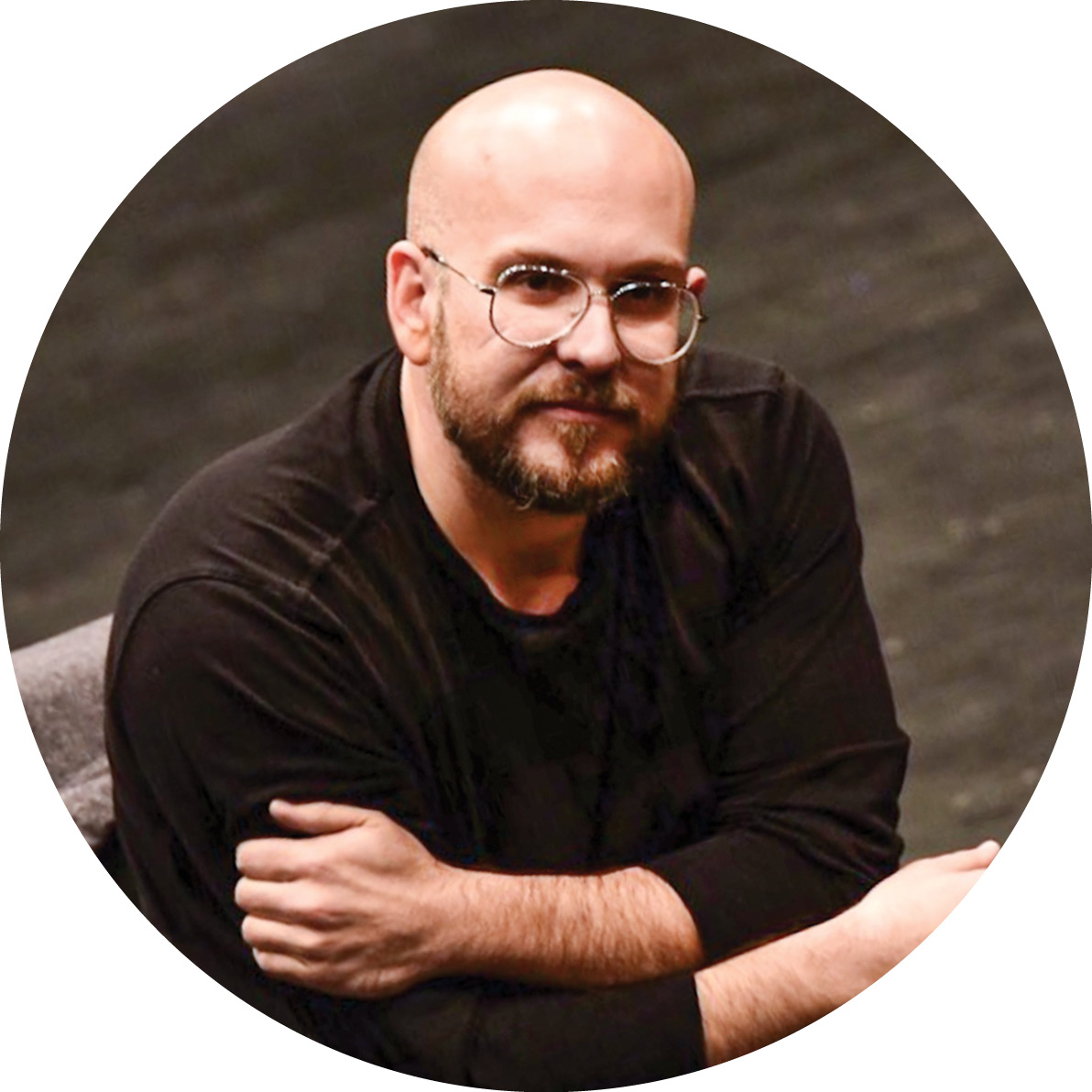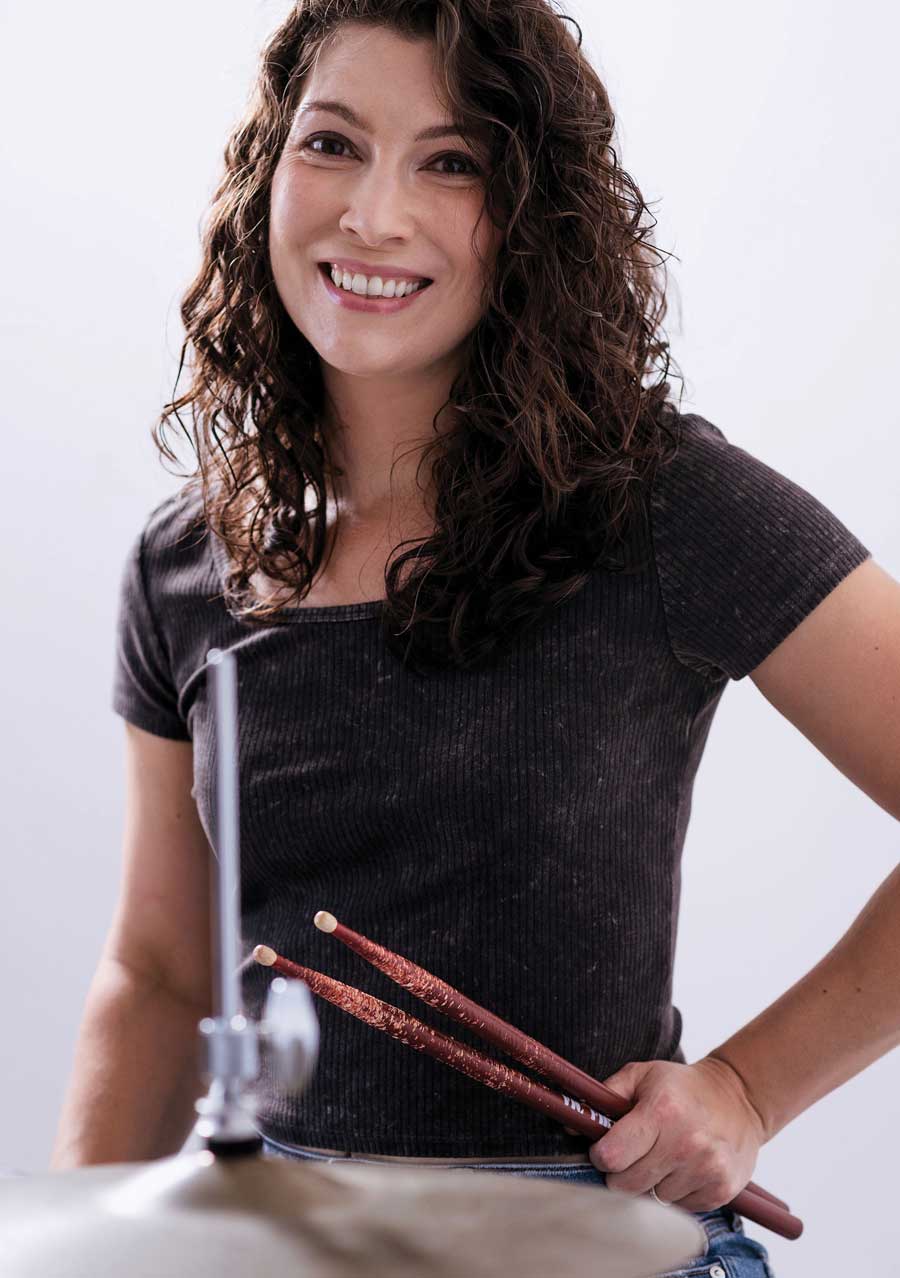Bears on Broadway
They say the neon lights are bright on Broadway
They say there’s always magic in the air
Consisting of 40-some-odd professional theaters, each with 500 or more seats, located in the Theater District and at Lincoln Center in Midtown Manhattan, Broadway is the beating heart of the American professional theatrical industry. Getting there as a professional isn’t always easy, but those who “make it” — whether in an on-stage role or working behind the scenes around the clock to create, manage, support, produce, design, build, accompany, assist, choreograph, write and direct — are the heart of the elaborate, always soul-stirring theatrical performances that define the magic of Broadway shows.
It should come as no surprise, then, that across all these roles — both on stage and behind the scenes — are dozens of Baylor University graduates who’ve found success. Here they share their unique perspectives as they journeyed from Baylor to Broadway.
In the Spotlight
Elizabeth A. Davis, B.F.A. ’03, is an award-winning actor who recently starred on Broadway in the musical comedy 1776, which portrays the founders of the U.S. in surprising and innovative ways. Davis played Thomas Jefferson in the American Repertory Theater’s revival of the 1969 Tony Award winner for Best Musical.
In 2012, Davis starred as Réza in the Tony Award-winning Once, for which she herself was nominated for Best Performance by a Featured Actress in a Musical. In 2013, she joined actor Christopher Lloyd in a production of Bertolt Brecht’s Caucasian Chalk Circle, and in 2014, Davis starred in Four Last Things at the American Globe Theater.
When she first moved to New York City, she “immediately had two jobs that didn’t pay enough”— one as a barista, the other selling boots and buckles in the Time Warner building.
“I had resolved myself to a deeply lowered quality of life for as long as was necessary,” she laughs, “in the pursuit of creating stability through storytelling.”
Of course, Davis would go on to become a bona-fide star in every sense of the word. Her résumé is littered with dozens of roles in film, television, Broadway and off-Broadway. She has music and voice-over credits and is a classically trained violinist. She also works to raise money for Baylor’s Joe Lightfoot Gonzales Memorial Endowed Scholarship Fund, which she set up to honor the life of a Waco man she met through Mission Waco and on whom she based the lead character in a musical that she wrote.
“Repetition cannot be replaced or faked. Any pro gets their reps in somehow, whether it be a baseball player, a surgeon, a farmer, or an actor.”ELIZABETH A. DAVIS, B.F.A. ’03
But for all her wide-ranging success, Davis is quick to credit the support of her friends, family, community and alma mater.
She sidesteps talking about the fame from her myriad roles, instead focusing on the craft and labor of acting.
“(You) need to love the work for the work itself, rather than just seeking the fruits of what (you) may get from it,” she says. “Repetition cannot be replaced or faked. Any pro gets their reps in somehow, whether it be a baseball player, a surgeon, a farmer or an actor.”
The Animating Spirit
Rob Askins, B.F.A. ’04, is a multidisciplinary writer and playwright. His 2016 play Hand to God was nominated for both a Tony Award and an Olivier, and won an Obie Award. It was named a New York Times Critics’ Pick and had critically lauded runs on Broadway and London’s West End. He has gone on to write on three seasons of Netflix’s popular show The Umbrella Academy.
Aside from suffering, he jokes, what a playwright does is write everything a character says on a theater stage.
“Obviously directors and actors bring a huge amount to the process, but the initial concept, the title, the words on the page — one could argue the animating spirit — is provided by the playwright,” he says.
Askins came to Baylor with the goal of being an actor.
“But for good or for ill,” he says, “I couldn’t get on stage.”
It was Baylor Theatre Chair DeAnna Toten Beard, Ph.D., whose gift of “a book of these amazing, violent, funny, strange, outrageous plays” by English playwright Sarah Kane that served as an inflection point in his career and in how he thought about himself and playwriting. It inspired him to write his very first play, one that he says managed to get everyone mad at him at once.
“And that’s how I knew that’s what I wanted to do!” he laughs.
Askins points to Baylor’s programming through the theatre department as seminal in introducing him to people from the New York theater scene.
“I had a home when I got to New York, and that was one of the more valuable things,” he says. It was that home and that community that provided him the playground in which to experiment and practice as a writer and where he “wrote a lot, a lot, a lot of terrible plays!”
Nowadays Askins is working on a new Netflix show, one that will be set in the Old West. He has a final piece of encouragement for any would-be playwright or author.
“We can all write stuff that ends up on a teabag, but there’s weirder stuff, there’s more interesting stuff, there’s more complex stuff inside of you, and people are not always going to be ready to hear those things,” he says. “That’s why you have to, with your personality and the way that you live and the way you move through the universe, explain the way the world looks to you and you alone through the maze that is craft.”
Learning By Doing
While actors and writers get much of the limelight, stage managers are known in the industry as the glue that holds a production together. Jason Hindelang, B.F.A. ’02, is a stage manager who has worked on Broadway productions of Passing Strange, War Paint, Front Page and Carousel, among others. He was the production stage manager on Plaza Suite.
“I’m primarily the liaison between the creative team and the production departments,” he explains. “I work very closely with the director during the rehearsal process, coming up with the daily schedule, as well as noting what transpires … on a daily basis and communicating that information to the team.”
Traditionally, it’s the stage manager’s job to maintain the show from an artistic point of view. For example, in comedies, Hindelang says, performances can tend to get a little bigger and broader as time wears on, and actors might find a laugh where there wasn’t necessarily one on opening night. “So (a stage manager) might say, ‘That moment’s getting a little big, and I think we need to pull back a little bit.’”
One of Hindelang’s favorite parts of the job is supporting actors in order for them to give their best performances. “That can be just creating an environment where they feel safe both backstage and on stage, and can also ensure that they are able to give their best performance.”
When he first got to Baylor, Hindelang wanted to be a director, but there wasn’t an undergraduate program in directing. Instead, he focused on acting, while doing as much work in the various crew departments as he could, watching and learning from stage managers.
“I started thinking that might be a happy medium on the road to directing — or actually instead of directing,” he says.
One of the best ways of learning how to do just about anything — “theatre included,” Hindelang says — is by doing it, and he acknowledges the opportunities he had at Baylor to act in, produce, direct and design his own student-led work as instrumental in his learning and growth.
Part of the Legacy
Experience in the theatre is helpful for building a career, but one doesn’t have to have studied theatre to be an enthusiast or find a place on Broadway. Kat Largent, B.B.A. ’17, is a digital media planner at Playbill, the iconic industry-standard publication. The monthly magazine is handed out at every Broadway theatre and printed for particular productions as their programs.
Playbill, which published its first issue in 1884, also operates a digital site for the theatrical entertainment industry and everything tangential to it.
“Not to be that theatre person, but to be in the room where it happens, and be a part of this legacy and to be a small piece of that puzzle is really exciting and a joy and an honor,” she says.
Largent grew up loving musical theatre and participated at the community level, but knew she didn’t want to go into performance. She says she was looking for something “a bit more stable” professionally. To get there, she credits her time as a Baylor Business Fellow as indispensable to her success because it allowed her to combine marketing and business administration with public relations.
“I was surrounded by the most loving faculty and staff who help you figure out who you are, what you want to do, and how to communicate with and make sense of the world around you,” she says. “There’s not a single day when I’m not using some skill that I learned or at least honed well at my time at Baylor.”
Largent has some pointers for young people dreaming of making it on Broadway.
“Don’t be afraid to reach out, to me specifically, but also to other people in the industry. Do your homework. Be obsessive about it when you’re trying to find these kinds of opportunities because it’s really, really difficult if you don’t have a foot in the door.
“And remember, no matter what job you’re in, even if it’s your dream job, at the end of the day, it’s still your job and it should never define who you are or where you derive your value and your sense of self-worth, because that comes from a much higher source.”
Weaving Different Threads
The child of folklórico choreographers in deep South Texas, Brisa Areli Muñoz, B.A. ’11, understands the intersection of identity and art. Muñoz is the artistic director of the Musical Theatre Factory and the New York City Department of Education’s All City Theatre. She was also associate director for American Repertory Theater’s production of 1776.
Muñoz came to understand the value of art as community capital through her parents’ Mexican folk dance company.
“I look back on my childhood, and I realize that actually a lot of what my parents provided for me, in terms of an environment, set me up to be at the front lines of change, in terms of artistic form and craft,” she says.
After joining the department as a junior, a conversation with Baylor Theatre senior lecturer Lisa Denman, M.F.A. ’99, led Muñoz to pursue master’s degrees in New York in Applied Theater and Organizational Change Management.
“I started holding space and facilitating space with peace-building educators in Duhok, Iraq, or for international mediators in Bucharest, Romania — all using theatre as the vehicle for discourse, for conversation about their real needs and concerns,” she says.
It was this work that led her to be recommended to 1776 co-director Diane Paulus by a mutual friend. As associate director, her responsibility was to keep notice of not only group dynamics, but also be able to deliver directors’ notes to the cast. Muñoz says it means helping to champion the designers throughout the process to make sure that all parties are having the same conversations about what the work is, and where it needs to get to.
“The work of an associate can, in some ways, seem invisible and yet actually somehow touch every component of the musical theater-making process,” she says. “A lot of what I do is support the directors in executing that vision.” She also comes in separately as a diversity, equity and inclusion consultant whose responsibilities often feel like “catalyzing opportunities” for community care to be present in the production.
“It very much feels like lots of different threads weaving together, intersecting,”
she says.
The Heartbeat of a Performance
Britton Matthews, B.M.E. ’05
Britton Matthews, B.M.E. ’05, followed her passion for percussion to New York and is currently a percussion sub for the Tony Award-winning SIX on Broadway and a drum sub for Little Shop of Horrors. She has previously subbed drums with the Yiddish revival of Fiddler on the Roof and The Nutty Professor.
Here’s how subbing works, according to Matthews: “Usually a show has a main shareholder and they’re responsible for making sure that the eight shows each week are covered. But they can sub out up to 50 percent of those shows if they are sick or just want to play somewhere else for a night or travel or spend time with family. You might not want to play the same thing eight times a week, 52 weeks a year. So, I step in to fill in for those shareholders!”
To be able to step in at a moment’s notice to play for any number of different people in any number of different performances means Matthews can pretty much play, well, everything.
She is a master of the mallet percussion instruments — marimba, vibraphone, xylophone — and the orchestral stuff — snare drum, timpani, cymbals, bass drum, “anything you’d see in the back of an orchestra!” She took some classes on West African djembe drumming and other hand drumming techniques. She’s taken Conga lessons. And she can also play a regular drum set for more traditional pop and rock acts.
Her expansive repertoire in percussion began in high school marching band but was nurtured by the community she found at Baylor.
“What sticks with me almost 20 years later is the people, the instruction from instructors who really cared about the person,” she says. “You know you weren’t just a number. They cared about working with the individual and making sure that they were speaking to the needs of the individual and finding the right way to provide instruction to really help me grow.”
Flash-forward those nearly 20 years, and to make it on Broadway, Matthews says you have to be good at maintaining relationships. Baylor helped with that, too.
“There’s no shortage of talent, so when you’re closing the little (orchestra) pit, eight shows a week, 52 weeks a year, musicians want to spend time with people whom they enjoy being around. Being a good player gets you the first gig. Being a good human gets you called back.”
Other Notable Bears on Broadway
SETH GIST, B.F.A. ’12 – Gist, as a Project Manager in various scene shops serving NYC, has managed the build of numerous productions on Broadway, on tour and beyond. His notable projects have included American Son, Latin History for Morons, The Cher Show, My Fair Lady, national tours of Hamilton and the Tony-Award winning set of Hadestown.
VICTORIA GIST, B.F.A. ’14 – Gist is a costumer who while working in various costume houses in New York has built pieces for The Lion King, Hamilton, the Radio City Christmas Spectacular and others, as well as for film work such as The Get Down and Ocean’s 8.
KIM GRIFFIN, B.F.A., ’13 – Griffin is a costume designer and technician who, in addition to working on Broadway shows, has stitched for The Met Gala, New York Fashion Week and the Manhattan Theatre Club.
CHRISTOPHER J. HANKE, B.A. ’98 – Hanke is an actor and singer who has starred on Broadway in various leading roles, including as Mark in Rent, and as Baldwin in the Tony Award-nominated musical Cry-Baby. He debuted in 2005 as the lead J.T. in In My Life.
MASON INGRAM, B.M. ’07 – Ingram is a professional drummer who plays in the indie-rock duo the Last Royals. He has subbed as a drummer and percussionist on Broadway’s The Lion King and has played in the musical Rent.
ZACH JENKINS, B.F.A ’15 – Jenkins works as a freelance Actors’ Equity Association stage manager. He was recently an assistant production manager for the Under the Radar Festival at New York’s Public Theater and was on the stage management team for their Public Works productions. He also freelances as an assistant stage manager with the New York Theatre Workshop.
DARRELL MORRIS JR., B.M. ’14 – Morris is an actor, singer and dancer who has performed at the Radio City Christmas Spectacular at New York’s Radio City Music Hall and on the road with the National Tour of Les Miserables playing Montparnasse and understudying Enjolras.
RICKY ROSHELL, B.M.E. ’18 – Roshell is a woodwind musician who has played with the Broadway National Tour of Hello, Dolly! in 2019 and has toured with the second National Broadway Tour of Disney’s Aladdin.
JEFF THEISS, B.M.E. ’05 – Theiss is a music director, conductor, musical coach and pianist who most recently joined the music team of the Book of Mormon on Broadway as rehearsal pianist, keyboard two sub and conductor sub. He is also the associate music director for the critically acclaimed Off Broadway hit The Band’s Visit.



